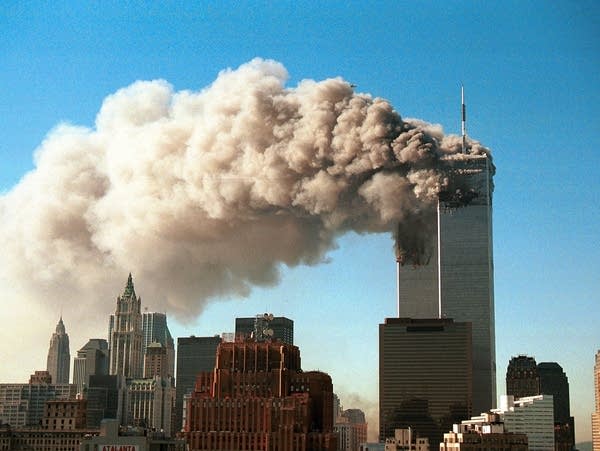Remembering 9/11 from the Marketplace newsroom
Listen to the original Marketplace broadcast from September 11, 2001, and read an essay from David Brancaccio about his memories hosting the program on that historic day.

Six weeks before the attacks on the World Trade Center, in July 2001, a public radio colleague broadcast a feature about an airplane hitting a New York skyscraper. It was a bit of history: a B-25 bomber struck just above the 79th floor of the Empire State Building in 1945, killing 14. Gasoline poured down the elevator shafts creating a fireball at ground level.
That was the first frame to come to mind when the news bulletin flashed the morning of September 11. Sara Harris, a production assistant at Marketplace, telephoned me shortly before 6 a.m. PST to tell me a plane had just struck the World Trade Center.
The frame of reference, of course, would radically shift almost immediately, amid the shock we often focus at the human level. A broadcaster since my early adolescence, I wondered about the safety of the transmitter operators running the antenna atop the World Trade Center’s north tower. There’s a plaque now at the public television station in New York honoring WNET engineer Rod Coppola who died in the trade center that day.
Within minutes, the Marketplace team was deployed feeding our morning programs. The New York bureau chief at the time, Bob Moon, narrated his eyewitness account of the second tower coming down. Amid the chaos of another city under attack, our Washington bureau chief, John Dimsdale, set to work to determine how policymakers were trying to safeguard the financial system. The commentary editor began tracking down New York-based financial historian John Steele Gordon to ask him to consider an essay for the evening’s broadcast.
Beyond the interviews I conducted that day, it was also my task to draft what we call the “Show Open” for the broadcast, words that would frame our coverage of that historic day.
I remember toying with a line I recalled “The New York Times” columnist Tom Friedman delivering to an audience in Indiana. It was about people who want to hurt us around the world becoming especially dangerous through communication and computer technology. “Super-empowered, angry men,” had been Friedman’s warning.
I also remembered a conversation I once had with political scientist Benjamin Barber about his view of “McWorld vs. Jihad,” a society driven by globalization and commerce coming into conflict with fundamentalism of all kinds.
Some people are surprised to hear I studied history as an undergrad. The implication: I would have been better served by business degree, given my professional beat. But quite often in the news business, history provides a very useful frame.
The Show Open I drafted for Marketplace that evening tried to encapsulate the story and capture a sense of the challenge ahead.
At 2 p.m. PST, 5 p.m. EST, a colleague pointed on the other side of the studio glass and I said: “Lethal acts of terrorism destroy New York’s World Trade Center, damage the Pentagon in Washington, and close much of American for business today. Gone are assumptions about personal, national, and economic security.”












